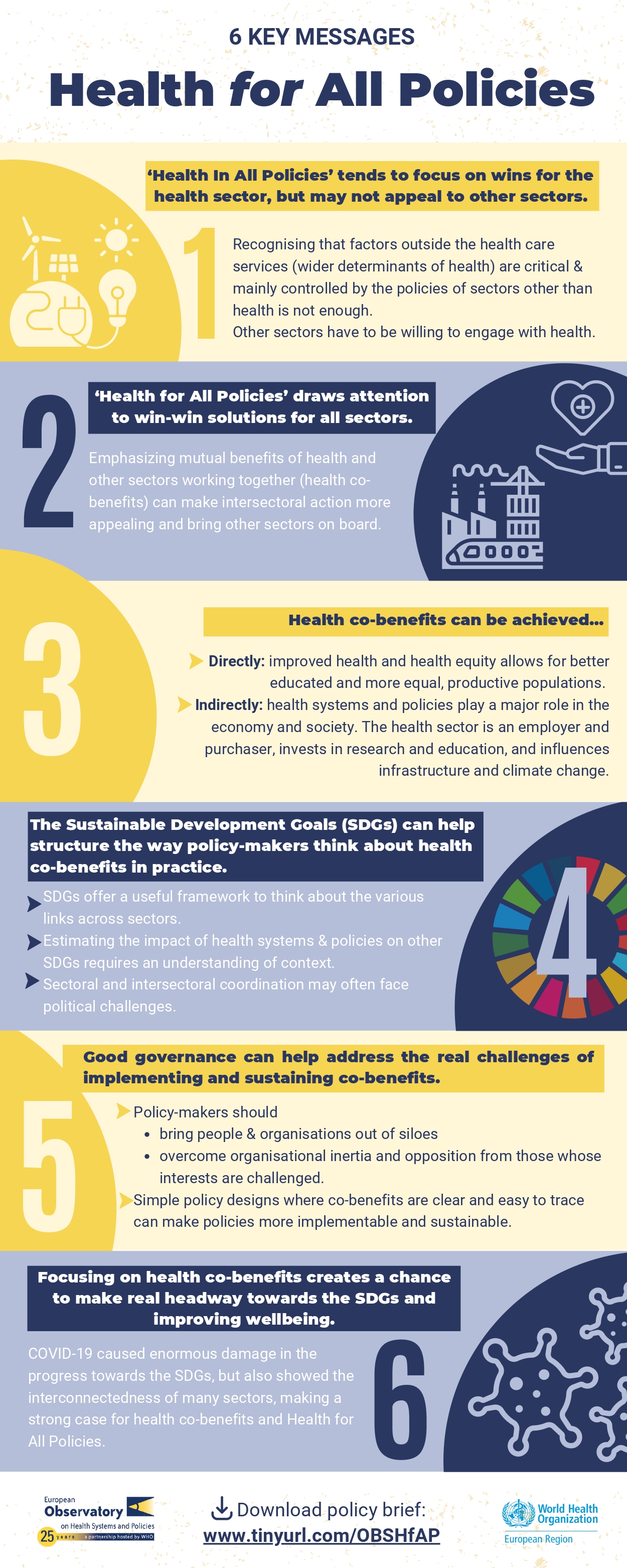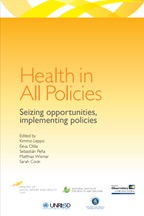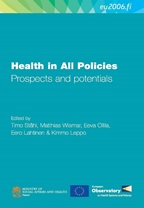
Health for All Policies: Mobilizing co-benefits for the Sustainable Development Goals
Health is not just a goal in and of itself, it is also a contributor to other goals. Health is not just in all policies, but for all policies. There are two ways in which health policy can contribute to achieving other goals, i.e., producing co-benefits . The first is through the contribution of health status to other outcomes, or the way in which improved health status and reduced health inequalities contribute to goals outside the health domain. For example, the health of children influences their educational attainment (SDG 4), and health inequities influence the ability of women (SDG 5), the poor, and vulnerable groups (SDG 10) to receive the benefits of education and then secure equal access to good jobs (SDG 8).
The second way health policy can contribute to achieving other goals, i.e., producing co-benefits, is through the contribution of health policy to other outcomes, or co-benefits coming from health policies. For example, expanding universal health coverage or child nutrition programmes can reduce poverty by eliminating catastrophic payments (SDG 1), improving education attainment (SDG 4) or employment outcomes (SDG 8).
The European Observatory on Health Systems and Policies has been working on a large-scale project on Health for All Policies, focusing on the Sustainable Development Goals (SDGs) and the co-benefits that can be created when different sectors work together with the health sector to achieve various goals. Using the concept of co-benefits, the project complements work on Health in All Policies, which focuses on the co-benefits to health of investment and policy in other sectors, work on the contribution of health to the economy, and other intersectoral agendas, and shows how health and health status can contribute to the achievement of all the SDGs.
Within this project the European Observatory has published an introductory article in the Lancet as well as a policy brief.
Other work includes:
- An edited volume focused on the contribution of health systems and policies to other goals published by Cambridge University Press.
- A special issue in the journal Public Health identifying co-benefits from health or health systems to other sectors thereby strengthening the case for investing in health, while also emphasizing the contribution of health and health systems to societal wellbeing.
The Observatory is currently planning activities related to this subject. If you would like to hear from us when details become available, please register your interest here.

Governance topics
publications
Health as a driver of political participation and preferences: Implications for policy makers and political...
Key messages: Health is central to people’s lives yet an under-appreciated influence on politics. People in poor health often have negative,...

Health for All Policies: The Co-Benefits of Intersectoral Action
Factors outside of healthcare services determine our health and this involves many different sectors. Health for All Policies changes the argument...
Health actors will not achieve their aims on Sustainable Development Goals unless they are able to change the narrative. Health in All Policies is a key...
Intersectoral governance and Health in All Policies
Since the health of a population is affected by policies and programmes originating beyond the health sector, governments need to employ a strategy that...
Intersectoral governance for health in all policies: structures, actions and experiences
Many of the policies and programmes that affect health originate outside the health sector. Governments therefore need to address population health using...

Health in All Policies (HiAP) is an approach to governance that systematically takes into account the health and health-system implications of decisions,...

Health in All Policies: Prospects and potentials
Health is largely determined by factors outside the health care domain. Efforts to integrate health considerations into societal policy-making with the...
Subscribe to our newsletter
Sign Up